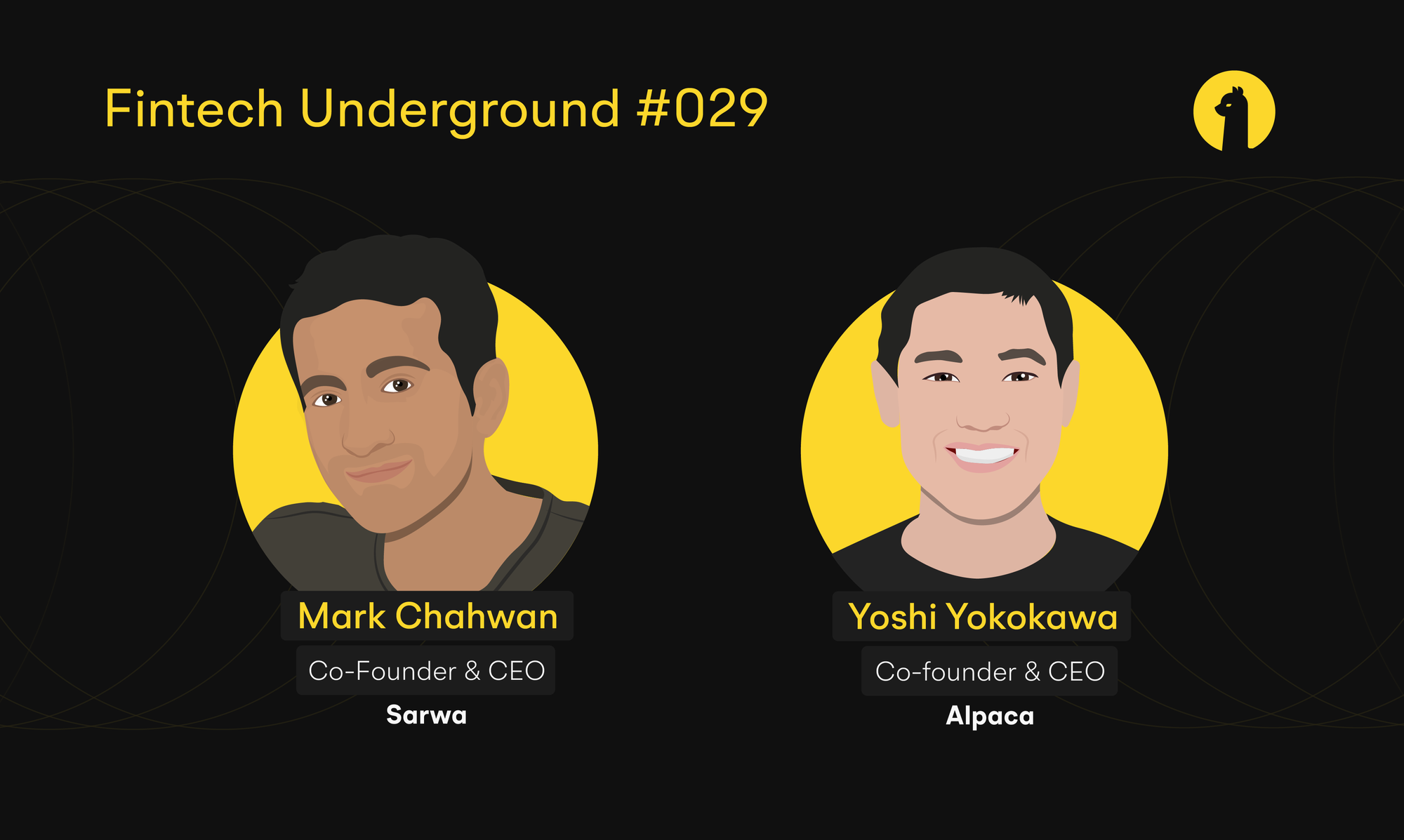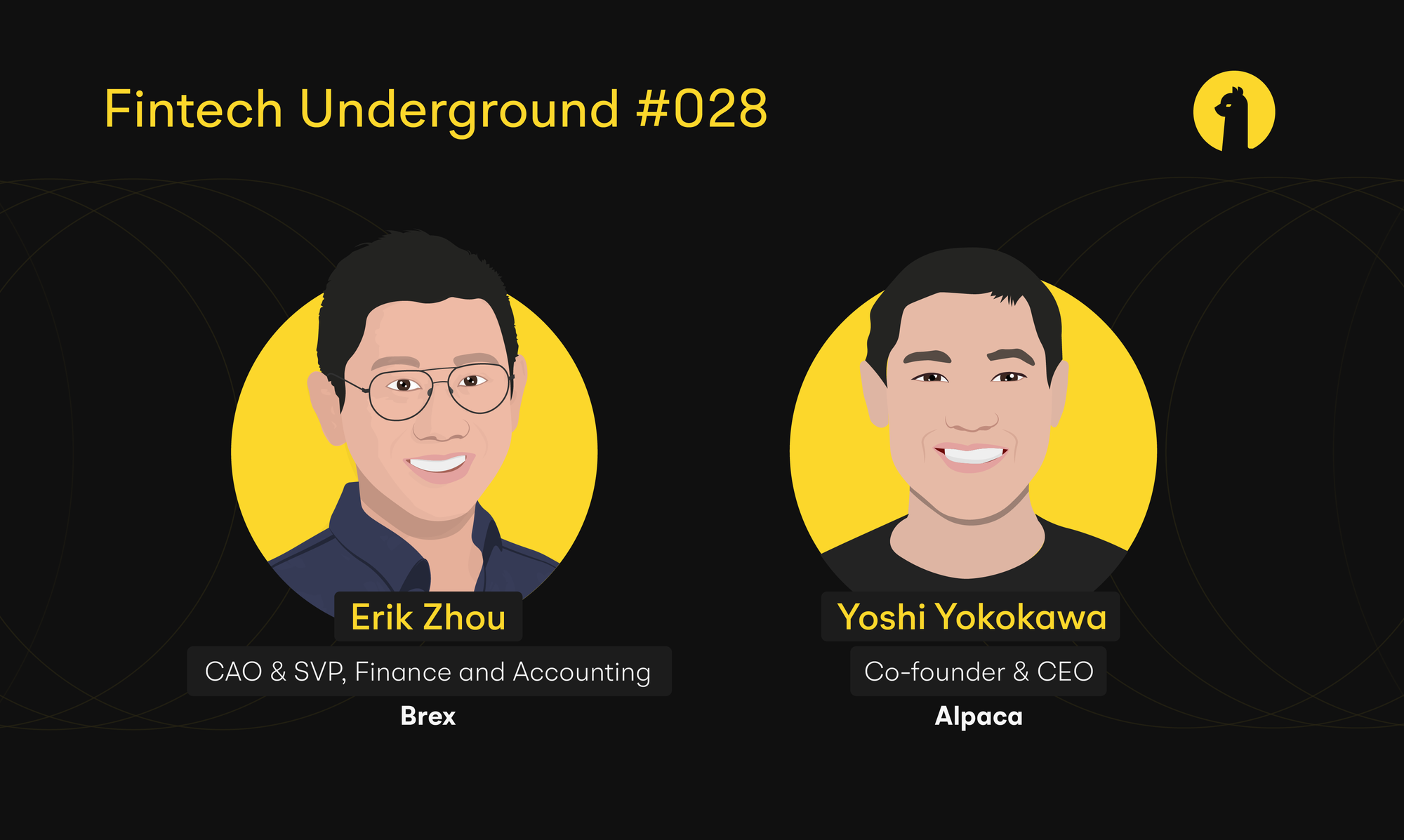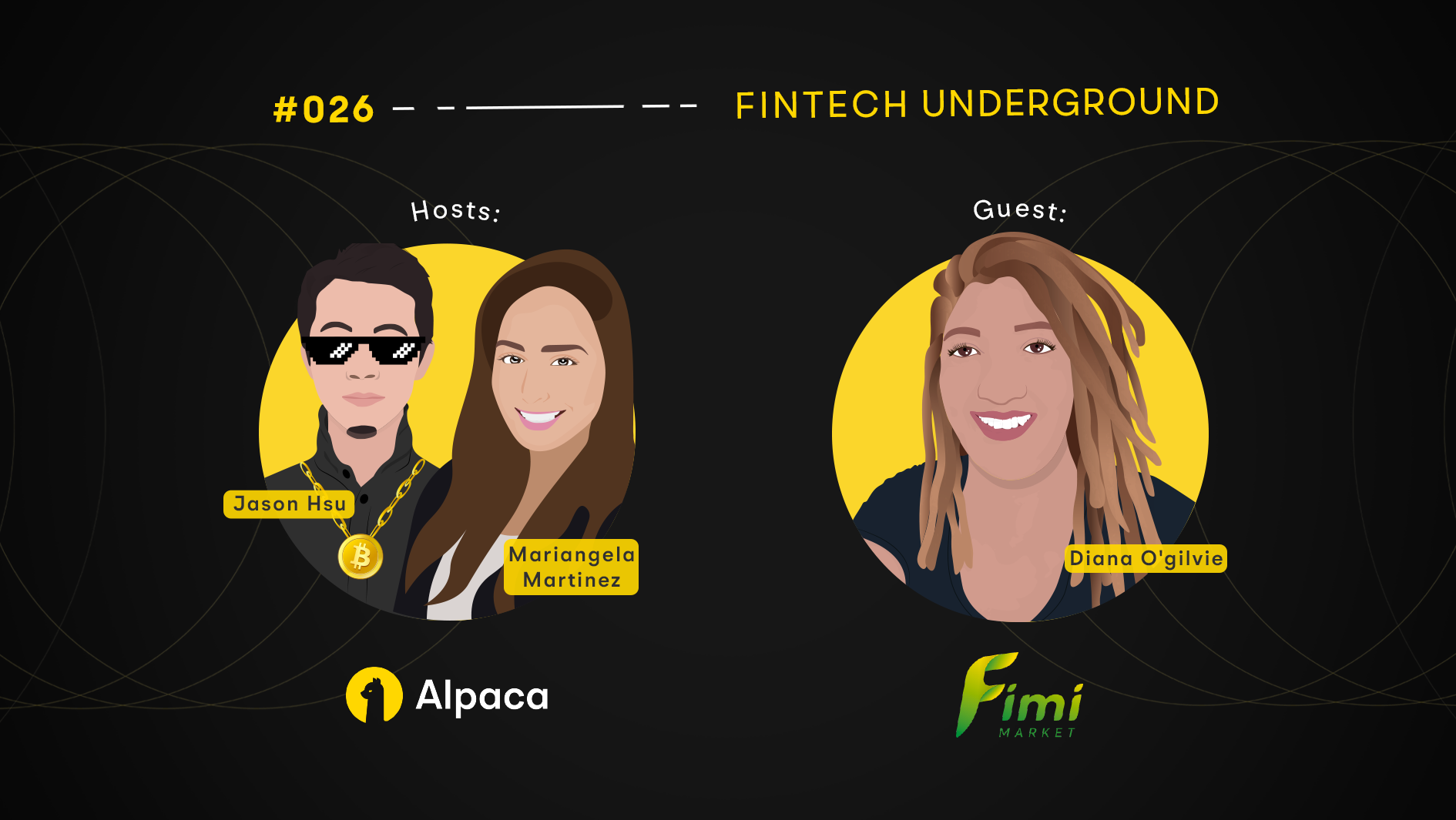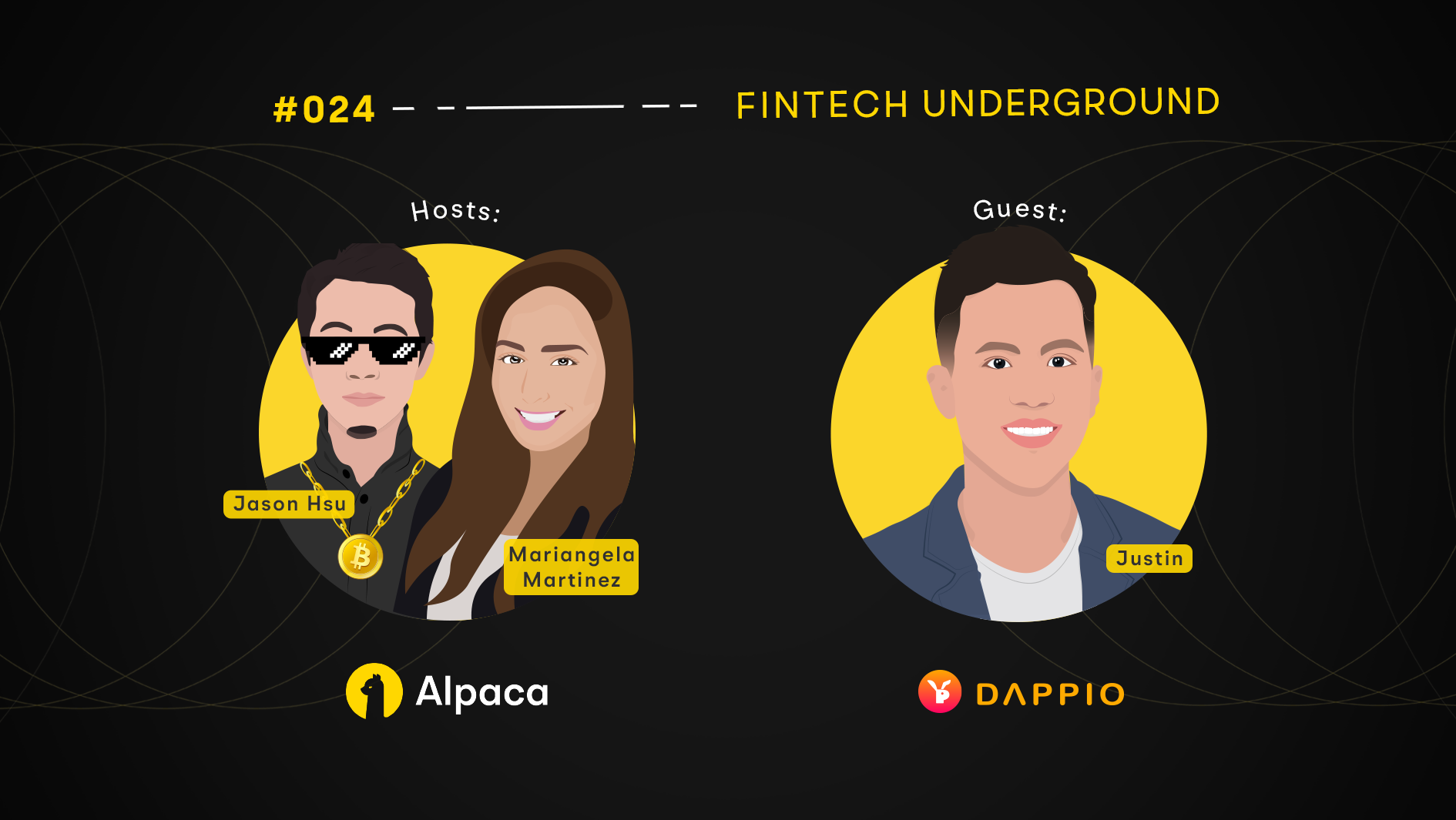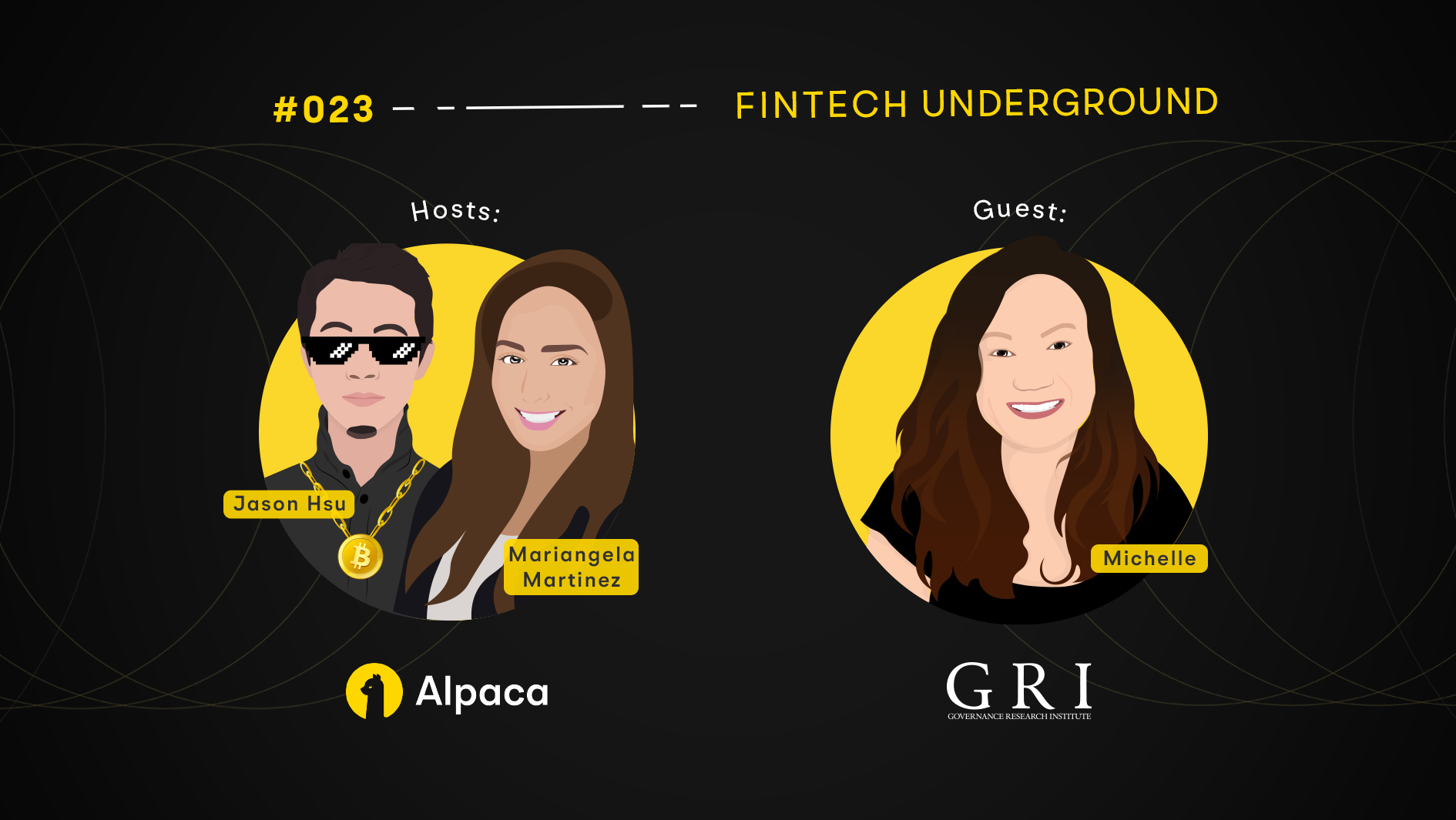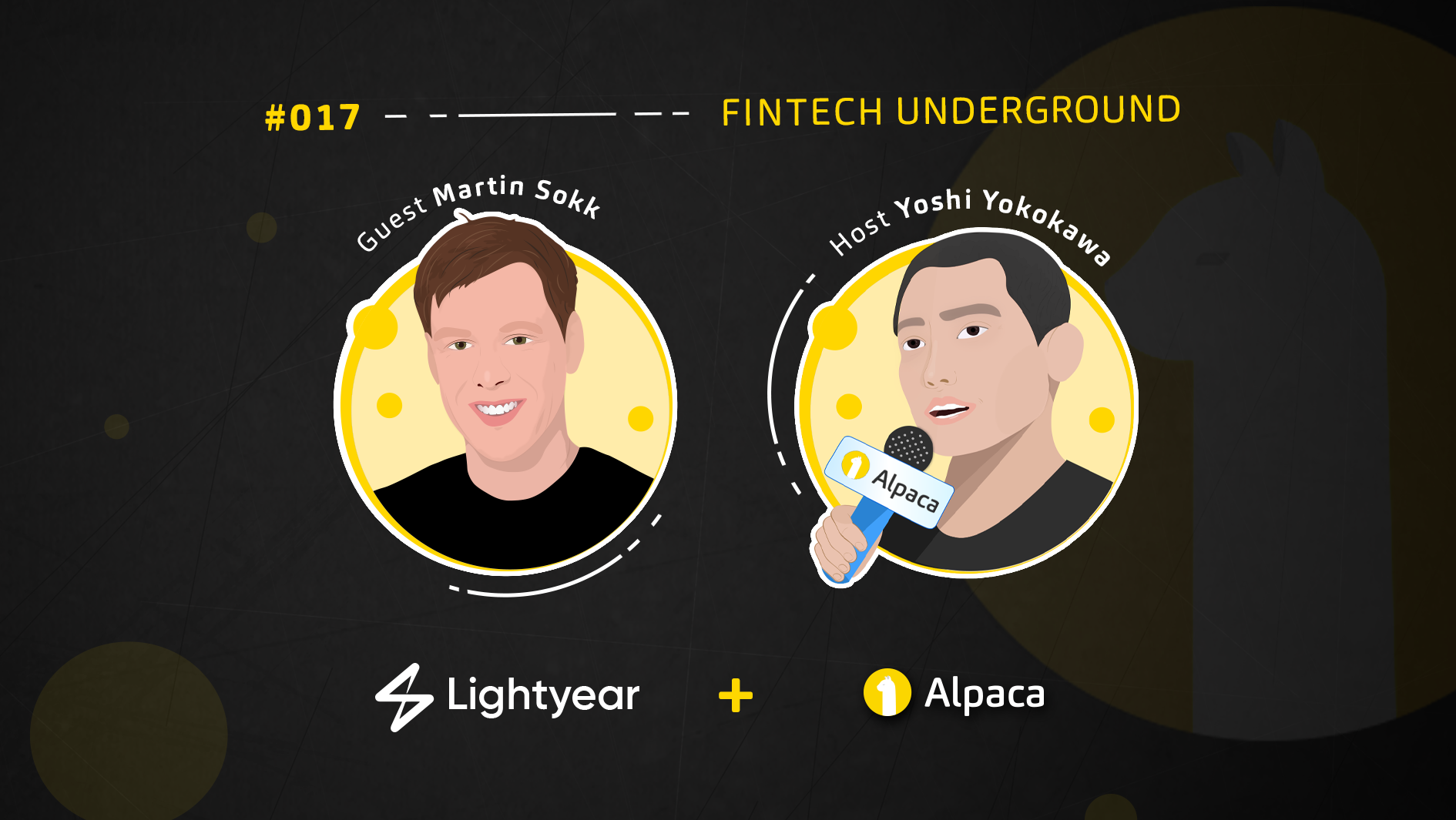
Any opinions expressed are opinions of the host and their guests. The content is for general information only and is believed to be accurate and reliable as of posting date but may be subject to change. Alpaca Securities LLC does not recommend any specific investments or investment strategies. Alpaca Securities LLC does not provide investment, tax, or legal advice.
Fintech Underground by Alpaca is a podcast devoted to all topics related to stock trading and APIs. From trading with algorithms or connecting apps or building out services, we aim to bring light to the different corners of Fintech.

TL;DR
In Episode 17 of Fintech Underground by Alpaca, we interviewed Martin Sokk. As the CEO and Co-founder of Lightyear, Martin discusses his product expansion strategy across Europe, differences between the US and European markets, and more.

Find the full transcript below. To hear more CEO/Founders of the most interesting Fintech companies speak about their experience in the industry check out our other episodes below.
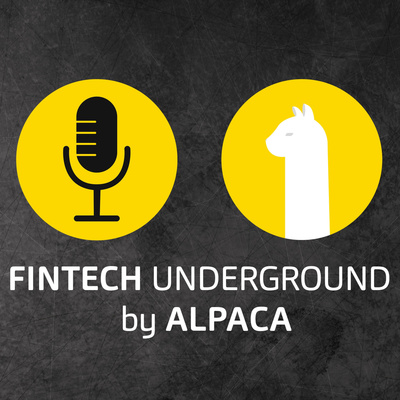
Full Transcript
Crystal: [00:00:00] Hi everyone. Welcome back to Fintech Underground by Alpaca, the podcast devoted to stock trading API. From algorithmic trading to connecting apps to building out services, Alpaca is built for developers. In each episode, we explore a different area within FinTech.
In today's episode, we're super excited to welcome Martin Sokk, CEO and Co-founder of Lightyear, a new investing app whose goal is to give all of Europe access to the world's markets without hidden fees. As usual, Yoshi, CEO, and Co-founder of Alpaca is our host. So let's jump right in!
Yoshi: [00:00:37] Hey Martin, how are you?
Martin: [00:00:40] I'm good. I'm good. How are you?
Yoshi: [00:00:41] Good, good. Thank you very much for coming to our podcast, FinTech Underground. We've been chatting, we've known [each other] for a while. And it's been a pretty exciting journey. Firstly, congratulations on the announcement of your fundraising!
Martin: [00:00:55] Thank you, it's pretty exciting right now, we literally launched a product yesterday and announced our latest fundraising. So we have raised $10 million to fund our journey.
Yoshi: [00:01:04] That’s a huge, huge milestone. And there’s a more exciting journey ahead. Firstly, do you want to have a quick introduction about Lightyear and what your app does?
Martin: [00:01:14] We're doing a really simple thing, and the thing is that one day we started thinking that it's incredibly weird how the investment market is so broken in Europe. The more we started looking into it, we found out that it's not going to last, but there are lots more people. At one point you realize it's 500 million people in Europe who don't have a good investment product. So what might we do? This is it, we're fixing that.
Yoshi: [00:01:40] Great, and looking at your LinkedIn profile, everyone notices that you are super high profile, super successful from your previous position at Transferwise. Do you want to have a quick introduction about how you got to this journey after your experience at several Fintech companies?
Martin: [00:02:00] Yeah, me and my co-founder, we both worked at Transferwise. I was running product operations people, teams, like what you do when you're in the early startup days and make the mastermind behind how the tech comes together.
But we both have been passionate about how you use technology to make not only investments but finance in general better. So what we have seen is people don't really understand how that can help them. And you have the big bang, but they usually take the day, the current offline servicing process and digitalize it.
And it doesn't really make sense. Like computer should be kind of driving the cost, like ridiculous. And it doesn't need to consider this kind of offline process at all. And I think TransferWise did that really well. So we do one simple thing. How do you send money from one country to another, but turns out it wasn't so simple. It's like legacy systems everywhere. You need to connect all to the different banking systems in different countries. Need to understand the customer and expand. But we did well, like Transferwise was listed last month and has grown into a massive company.
So we were coming from that background and when we started looking around, like, what's the next thing, weirdly enough, we both have been investing for more than 10 years. Every time you do it yourself, it's a little bit cringe because it's expensive, you don't have access to do the instruments, you need to cobble together all the different bits and pieces of information from various products to actually make the decisions.
If somebody came to me and said, where should I go to make my investments then like I'm sorry, I don't know. There's no good product out there. There are some products you can use, but in the end, none of them actually work for everybody in Europe. So that's why we stopped looking into that.
And we found out there are basically three things. What needs to be fixed is getting access and access in a way that can all the countries can access this product. And can you access their global markets? Can you do that in a really good [way] cost-wise?
The third part is maybe the hardest because it's less well-defined and less done in the world, is how do you make investment decisions when you're just getting started? How do you know what your risk level is? What's this market? What are these instruments? How do you know what to buy? And when you are a little bit more experienced in the market, then how do you get that information so you can make educated decisions? So this is what we're building here.
Yoshi: [00:04:35] It's interesting that people look at the success of Robinhood. And then in the US, we see companies like WeBull and Public and many startup fintech trading apps coming up. But in Europe, where did you see the opportunity compared to what's happening in the US? Did you do research on what's happening in the US and try to apply that in Europe or was your head in a different place, coming from TransferWise and looking at a global mindset?
Martin: [00:05:11] So the US is 20 years ahead of Europe, like so much has happened in our infrastructure way. The way how people do the investments, how they understand it, and all that stuff. In Europe, we are just learning that. And I think the thing that differentiates Europe from the US is that they are similar sounding like the US and Europe, but Europe is many countries. And we have seen the US companies coming here. It's like, ‘Hey, let's capture this market.’ It's actually a bigger market than the US, with 500 million people. But you're coming in and to see every country has its own regulator. And then you have these currencies, like pounds and euros and the Hungarian forint, and whatnot.
And then every country invests differently. Maybe even the UK people look towards a kind of single stock and whatnot, but also German ones look into different kinds of setup, maybe ETFs and whatnot. So it comes down to this kind of fragmentation.
And can you understand how to build? You need to build a global product but in every single country. So basically we are doing something similar with Transferwise did, is that you build a space platform. You give this access and now you're going to go country by country to build the good solution, what these people in that country need.
Yoshi: [00:06:32] Hmm. Wow. I think how TransferWise did, and how that's getting transferred into Lightyear is really interesting. And because you are not the only head of the product, like you actually run operations and you also run hiring and the People side too, right? So you kind of built a lot of the foundation of the company itself. So that's super interesting to see all the challenges that you would face as you try to expand fully into Europe.
What is the most important point when you're like, I'm trying to expand into Europe? You mentioned several things like different regulators and different currencies. What is that core thing that you always think about?
Martin: [00:07:20] I think you can split that into two different parts. One is so-called technical. Where like, are you able to reach with your app or technical solution in that country? Can you do the regulatory view tax reporting and whatnot? And all of these are a technical view because they're done somewhere [else] and you need to do it better.
And in that particular country, repeat that many times and fixed time fr often is really, really hard to do. But the second thing is a little more tricky, like in Transferwise in the same way that, how do you know what these people in that particular country, what I'm like, I have to say, like, I can barely speak English.
I've watched US movies, I have been in the US for a while. I think I know how the US is and then we launched TransferWise seven times in the US and we still didn't figure it out because it's not that you're seeing this other country and you understand what's going on, but you actually need to be there and you need to be a local in a way.
But that's true for every country in Europe. It's even more sometimes because a lot of people don't speak local languages and whatnot. So how do you really understand how they want to make decisions? What's their incentive? What's the risk and fear, how to create trust? We did something really cool at Transferwise. We hired all the foreigners and all the different offices like you had 30% of the company was not local. Like Germans, French, UK people, Americans, whatnot. And they were talking, we built the product and like district became like gray standards. Right. This is ridiculous. This doesn't make sense.
Maybe in Europe or maybe in Estonia, but we have one office you can ask like a personal ID code, and this is not the normal thing to do to log in. You go to the US and do ask these numbers. They're like, oh no, it's not the comfortable thing to do. So how do you realize what makes sense and what doesn't? That's the tricky part. So acquiring this knowledge you need to have feet on the ground, in that particular country
Yoshi: [00:09:21] And that is much more complicated than distributing the US, right? Because in the US it's not like, California people and Texas people and the New York people want different apps. It's, you know, they all speak English.
Of course, there's some difference, but Europe is like, you're right. It's different languages and different types of investment appetite, because looking at the percentage of the household income going into investment, I think the US is almost what, 40% to 50%. I do a lot of research on Japan because I'm from Japan. Like it's only 10%. And I remember Europe was like 20% or 25%, something like that. It's all different from each country as well.
Martin: [00:10:02] Exactly, I think it's kind of average is a little bit below 20 or something like that, but it depends on the country again, unlike a lot of countries. you have basically no access to any good investment markets that like doesn't, doesn't really make sense to invest. So there's no incentive for many people. What we have seen is that even looking at some of our competitors, in some markets the situation is so dire that however bad your product is, you're going to grow there. So that’s the difference.
Yoshi: [00:10:31] Got it. And specifically, which countries did you decide to focus on at the very very beginning?
Martin: [00:10:39] So we started from the UK. The UK is probably one of the most mature markets in that way, but still, it's the biggest English-speaking country. We have quite a bit of experience working in the UK because of TransferWise and that kind of grew the expertise in like, how do you build investments? How do you do the regulatory stuff and so on? It's a really good place to get started. The problem is Brexit. Brexit means that we need to do with different licenses to go to Europe. But it's good, we can start building our product and work on the regulatory review in parallel. So we launched yesterday in the UK.
Yoshi: [00:11:15] Congratulations, by the way, big congrats.
Martin: [00:11:18] Thank you. Thanks for helping us. And I'm launching Europe at the beginning of next year.
Yoshi: [00:11:24] Oh, wow. Wow. So when you say Europe, you're going almost full coverage to Europe next?
Martin: [00:11:31] Yeah, so not a hundred percent coverage, but we are trying to get into as many countries as possible on the first go and then start iterating the product. The main point is that every country is a little bit different, then it's like, how do you figure out all this...what people need and whatnot. You have the launch where you have an MVP product, then you can start learning from the customers and that's going to make your product better.
Yoshi: [00:11:55] Definitely, so thinking about your experience at Transferwise and then your step-by-step approach into Europe, how do you see that investment app landscape, which is of course the future of Lightyear? Do you already have the grand vision of how it should be, or are you kind of iterating as you figure out each country and what they want?
Martin: [00:12:21] You're asking how Lightyear is going to be or how the landscape is right now?
Yoshi: [00:12:24] Well, I think how Lightyear should be. I believe that you believe that Lightyear will be the major majority app that's going to take most of the people in Europe, and how it will look like as the end game?
Martin: [00:12:38] Yeah, so we are coming from the customer view first, and we try to figure out what's true for our customers. And you have these three bigger groups of customers.
The first group is like, I don't know how to invest. So if you look into all the people in Europe and most of them are not investing, it's like, how do you make this first step? How do figure out that this is a trusted place, you can be comfortable about the decisions, and so on? So you understand it's a long-term view.
The second group is more people who know what they're doing, but they need more information to make educated decisions. They want to have a good partner to reshare the market and then invest in that.
And the third group is more professional people who need specific tools like maybe margins and business accounts and whatnot. So we looked at these three groups and we see that there are quite a bit of different products, but we started from the concept that all of these groups need access to the world markets and need access in their country. So we're starting from this basic infrastructure. How do we get everybody access to all the markets and give them adapt at a reasonable cost? So this is true for everybody. And from there on, you have different products; you have products that would help you to make the first step, or I could give you more data and, or give you more features in a way because these people might be quite a bit different from each other.
It doesn't really make sense to merge everybody into one app. So we're going group by group a little bit, country by country, but also customer by customer, what they're going to do.
So I think that's the difference between the Europe and US, is that the US in many ways has this infrastructure already. And as you mentioned, there are loads of different solutions where you can go and onboard yourself; Europe largely misses that. Most people bank or invest through the bank at the moment. There are some smaller startups that are doing actually doing an awesome job. It's like finding a time to re-innovate a little bit on that market, but everybody's stuck in their own country. They are focusing solely on a kind of arms-length basis, but I think investing is a volume business. You need to service everybody.
Yoshi: [00:14:50] So, you're from Estonia. And you mentioned a pretty interesting thing about each of the apps, probably you're thinking about Trade Republic focusing on Germany, and Freetrade has been mainly focusing on the UK.
And One in Spain as well. So what made you think differently that okay, this has to be spread out in Europe, everywhere instead of oh, I'm going to focus on the UK, I'm going to focus on Estonia. Is that coming from your background or what made you different compared to other apps and other founders?
Martin: [00:15:28] I've been working in the UK for a while. So it means that you can kind of make sense, like today I'm living somewhere between Thailand and London, because we have offices in both countries. To answer your question really, really directly, Estonians are in a good place or a global expansion because there's no point to make a product in Estonia. There's not many people there. So if you want to actually scale a product, you need to go global, and that in many ways it's an advantage. Like you need to go and learn what other countries need and want and how do you offer the product there?
Otherwise, you have this snazzy boutique where you can offer the service, but in this kind of scale, it can't come down. And price-wise it’s like, you can't hire a big team to offer a good product and whatnot. So you have to go up. So it's in our nature anyway, but also TransferWise experience; Transferwise was inherently the product, which has to be in multiple countries because you're sending money from one country to another and this is what you do.
Yoshi: [00:16:28] Interesting. I think my coming from outside the US really made me realize the importance of making it international from the very, very beginning. So I hear what you're saying as being from Estonia. And I think we, in the beginning, chatted about the kind of similarity between the Estonians and Japanese. Like, you're not showing too much emotion, right? Kind of staying the distance and doing social distancing in our daily lives.
Martin: [00:17:03] Yeah, exactly. There’s a joke that during Covid when restrictions came in, that you had to be two meters away from the people. And then when this ended, everybody was happy that they could go back to that typical five-meter distance, what they usually have.
Yoshi: [00:17:19] Wow, two meters to five meters. That's a very big difference. I need to think about the Japanese version of the joke. Like, you know how we should be like two meters to, I don't know, three or five or six.
But going back to your people side and the office between the UK and Estonia, if you don't mind, how many people are you now?
Martin: [00:17:43] Yeah, we have 14 people right now, roughly split.
Yoshi: [00:17:46] Wow. Wow. It seems to be growing super fast because I remember talking with you and back in time, it was only two people and now it's 14 people.
So how are you thinking about expansion? You've focused on growing the UK office and the Estonia office, or now you're ready to kind of grow in different places and how are you also thinking about working remoteLY and working in the office?
Martin: [00:18:14] Lots of questions. First, agreed, trying to hire then kind of generally like the approximate radius is around these two offices. I'd like both countries, how they're kind of good sides and bad sides, but in the UK we’re going to have lots of expertise and kind of financial investment, and I know Estonia it'll have a lot of fintechs, like Transferwise has the biggest staff there. A lot of operational people, a lot of people who can handle the volumes and whatnot. So we're trying to figure out who's where, and I don't mind too much where the people will join working remote versus an office. I think everybody right now works in office for us, but I think it's not the typical office. It’s more of this kind of flexible that you can work anywhere for one, you can take a week, right?
To anywhere you can travel between the offices we got started during the peak Covid means that like half of the people are more than a half of the people who are hired through Zoom that we didn't actually physically see these people. So it kind of creates this situation where what do you do can't be bounded in one office. So in one room, it has to go to like Slack, Zoom, information has to flow. You need to make an effort to know the people who you are working with, and if you are working like that, then it doesn't really matter where you are. That said, I don't really like full remote work because we're moving incredibly fast. We need to make a lot of decisions. You want to be in a position where you can take a whiteboard and try to scheme something out and then go and execute that. So a lot of people enjoy coming to the office, actually working together because it's kind of crazy, this good feeling that there's one group of people challenging this big market.
But we'll see, I think we're going to continue in a similar way because you're doing global business, you have to be everywhere. That kind of means that you have to be online most of the time.
Yoshi: [00:20:11] Right. And since you have also experienced running the people side of transfer wise, you already know how to scale to different places and what you want to be really careful about.
Martin: [00:20:23] Yeah. So I think what's important is this. People have to realize that you need to make them regular booking online. You have to make an effort to know what the other person and you need to be able to respect their culture, like bringing a Japanese, Estonian and an American into one room, they think differently.
So in that sense, if you put that behind the screen, it's sometimes a little bit hard to understand what's the emotion behind that. So making that, therefore trying to understand that respect everybody's culture, that's kind of like makes an environment where everybody can be happy or understand that it's sometimes even the Estonian answers like really directly.
And it doesn't mean that they're mad because that's the way to doing. So we're putting a lot of focus on, uh, that everybody understands what they're doing. Everybody has their own kind of responsibility, and they communicate outwards. So when you are in a small office and everybody's here, then you can have ad hoc communication, but if you're remote, you have to push information and you have to make an effort that other people understand what they're doing and if you see that they are not a hundred percent clear, then it's your job to go in and explain that. It's not like, oh, I did my part, now everybody needs to understand that. I think everything essentially comes down to the communication and understanding of other people.
Yoshi: [00:21:43] Yeah. And like that's super well said. That's something that I think about the most right now, because my personal company OKR is to hire a Head of People. So I'm dealing with exactly the same thing. How can we make communications smooth over the remote environment?
And yeah, you're right. Like any information, it has to be always a push instead of a kind of overheard something will pull. So that really does change the dynamics of the communication among the teams.
Martin: [00:22:12] It's a massive topic, we could talk hours about it, but another kind of dynamic in a remote environment is that people have to be able to make decisions...if they're not able to make decisions and they need to wait a day when the other guy wakes up somewhere and responds.
So if they're able to make decisions, then you can start moving quickly. That means you need to trust people to make decisions. You need to give them the power and confidence that they can do that. So in that sense, it's a little bit different dynamic to the typical top-down I'm going to tell other people what to do, but people need to do their own stuff and move quickly.
Yoshi: [00:22:48] I think when this app launch fiasco is kind of settled a little bit, I need to book some time of yours and get some advice on the remote team running. And going back to the app, you talked about Europe and conquering Europe. How are you thinking about the global market in different regions like Africa, Middle East, Asia, and the United States?
Martin: [00:23:20] We don't pay any attention to that at the moment, because it's always tempting to go after big markets, but we started this business because the European market is broken and this is what we need to fix at the moment.
It's kind of big time. It's like we have our first and we'd be out there. Like you, why want to develop so much further before I'm actually happy that everybody can use this in a really confident manner. So I think we're going to focus on the next five, whatever years in Europe and then solve that country by country.
Yoshi: [00:23:53] That makes sense. And looking at Robinhood, of course, you know, they tried at the beginning their China expansion and Australia, and of course, most recently UK and pulled off and it's taken, I don't know, 10 years, I would say to even get out of the US, so that makes sense.
Martin: [00:24:10] It's a scary market. You have to make a business decision. If you're looking around you, like you're in the US, and it's a big market. You need to be in their own market, but also when you have Brazil and China and whatnot, they're big markets. Now you're coming to this fragmented European weirdness. And how do you make your business make sense here? So in many cases, people are like, Hey, makes sense to go to Brazil because there are lots of people, similar kind of setup. And you can go easily to the business. And people avoid Europe because of that, but somebody needs to solve this here as well. So I think this is us.
Yoshi: [00:24:48] That makes sense. Wrapping up our conversation, I always ask this one question, but considering that you mentioned two things, right? The technical challenge of regulations and of course, building on top of that. And the second piece is about demands from each of the countries. As we've experienced together, you know, a lot of compliance and the regulatory license stack, you've been dealing with a lot of financial services-related restrictions and how to navigate through those things.
So I always think FinTech is much more complicated because, in addition to what the people want, you have to think about how we actually build it based on regulation. So is FinTech worth it to be in, that is the question.
Martin: [00:25:36] Depends largely on who the person is. I think everybody in, like, they are excited about Excel, excited about complicated solutions and whatnot then if you take these people, then these people are excited about solving regulatory problems, solving that kind of financial problems. And then this is a hundred percent perfect, but there's a lot of people who enjoy something different.
It's not an easy place to be. In many ways, you are more a compliance product and investment product because you need to navigate that landing. And on-site detail, and you have to have a constant dialogue with the regulator, like how to make it happen. So it's totally a different beast.
It is hard, but in the end, I think finance makes so much difference in people's lives. So in the end, today my fear is that people go through their lives and don't invest at all. So they don't have exposure to the global economy. In the end, it's going to be difficult because you don't have that wealth.
You can't support the normal life, in a way. This is what I want to solve. And we can talk about investing in a kind of short-term view, but I think people should invest long-term to view globally, minimize the risk, and actually have that exposure; this is the way where we can improve people's lives. And that's a hard job, from a regulatory review and technical view, convincing people that it makes sense, but in the end, definitely perfect because you're helping others.
Yoshi: [00:27:10] Yeah, that's super. I 120% agree on that, how important this is for a lot of people's lives. I’m super excited to be working with you and congratulations again for your launch and fundraising update. Thank you very much for coming to our podcast, Martin.
Martin: [00:27:30] Thank you, Yoshi.
Crystal: [00:27:31] Thank you for joining us today on this episode of FinTech Underground by Alpaca. As always, check out all of our past episodes on Apple Podcasts, Spotify, and other major streaming platforms.
If you liked this episode of Fintech Underground by Alpaca, make sure to check out our other episodes below!

You can also follow Alpaca and our weekly updates on LinkedIn and Twitter.
Brokerage services are provided by Alpaca Securities LLC ("Alpaca"), member FINRA/SIPC, a wholly-owned subsidiary of AlpacaDB, Inc. Technology and services are offered by AlpacaDB, Inc.


